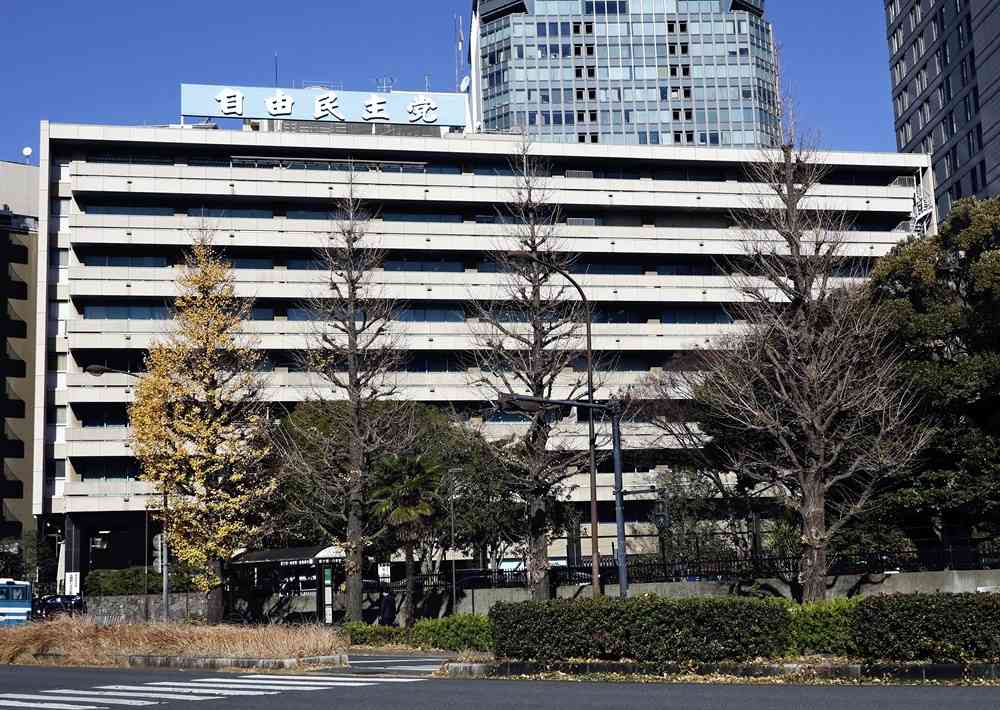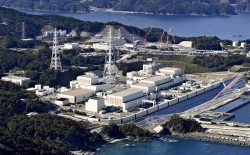Presidential Race for Japan’s LDP Hinges on ‘Change’; Younger Politicians Prepare to Jump In

The Liberal Democratic Party’s headquarters in Chiyoda Ward, Tokyo.
21:36 JST, August 15, 2024
When Prime Minister Fumio Kishida announced he would not run in the Liberal Democratic Party’s presidential election slated for September, he insisted that the ruling party must demonstrate change.
“In this election, we must clearly show the public a new LDP, an LDP that will change,” Kishida said at a press conference Wednesday.
A Yomiuri Shimbun national opinion poll conducted in July revealed that support for the Kishida Cabinet was stuck in the 20% range for the ninth consecutive month, as the impact of a hidden funds scandal that embroiled several party factions continued to reverberate.
Despite this, the absence of strong rival candidates led many officials in the Prime Minister’s Office to conclude that Kishida had a decent chance of winning the presidential election. But ultimately, Kishida revealed to his close aides that he had decided to step aside.
“It’s not a matter of running because I can win or not running because I can’t win,” Kishida reportedly told his aides. “We can’t push our policies forward unless the public is supportive. The leader has to take responsibility for the ‘money-and-politics’ problem.”
As Kishida falls on his sword, the candidates lining up to replace him as LDP leader and prime minister will be tested over whether they can translate calls for reform into tangible action.
Distance from factions
There are growing expectations within the LDP that two members who would personify a sense of party renewal — former Environment Minister Shinjiro Koizumi and former economic security minister Takayuki Kobayashi — will contest the presidential election.
Koizumi has told close aides that the LDP’s survival could hinge on implementing major reforms. “Unless the presidential election shows the public that the party has changed, the LDP will be finished,” Koizumi reportedly said.
“We’re making preparations with a view to running in the election,” one aide told The Yomiuri Shimbun. “It seems Koizumi is growing more and more inclined to jump in.”
Koizumi, 43, was first elected to the Diet in the 2009 House of Representatives election, in which the LDP suffered a crushing defeat. Koizumi’s experience of the party’s challenges while out of power has led to a strong sense of urgency about the LDP’s current predicament. Koizumi’s father, former Prime Minister Junichiro Koizumi, attracted widespread public support by openly stating he would “smash” the LDP. Some lawmakers hope that the younger Koizumi can revive that sentiment.
Koizumi has not affiliated himself with an LDP faction. If he decides to throw his hat in the ring, there will be questions over whether he can garner wide support from within the party without being influenced by factional dynamics.
Former Prime Minister Yoshiro Mori still wields considerable influence over the Abe faction, officially called the Seiwa Seisaku Kenkyukai. Junichiro Koizumi, 82, was once a member of this faction, and Mori, 87, has indicated to close aides that he intends to throw his support behind the younger Koizumi. It remains unclear what distance Koizumi will keep from Mori.
‘New face’ for the party
Although Kobayashi, 49, has a low public profile, he has attracted some attention as a “new face” for the party. In a statement issued after Kishida announced he would not run in the election, Kobayashi said, “We must carry on reform efforts that will convince people that the party has been reborn.”
Tatsuo Fukuda, a former LDP General Council chairperson and an Abe faction member, was elected to the Diet at the same time as Kobayashi and has been among the mid-ranking and young LDP lawmakers who have been holding meetings and other events to build support for Kobayashi. They are said to be confident of securing the support of 20 LDP Diet members as required to officially qualify Kobayashi as a candidate.
“I think he’ll announce soon that he’s running,” a lower house lawmaker who backs Kobayashi said.
However, on an online program on Aug. 9, Kobayashi said that the removal of Abe faction lawmakers from key positions as punishment for Political Funds Control Law violations needed to be reviewed. His comment drew criticism, with one critic saying, “It runs counter to the party’s reforms.”
Experienced politicians in the mix
Some veteran politicians and previous leadership candidates are also eyeing their chance to stand at the LDP’s helm.
On Wednesday evening, LDP Secretary General Toshimitsu Motegi met with LDP Vice President Taro Aso, 83, to relay his intention to join the race, a step apparently taken only after Kishida’s withdrawal removed a major stumbling block. Some LDP members were concerned that had Motegi run against Kishida for the presidency, he could have been seen as an “Akechi Mitsuhide of the Reiwa era,” a reference to a 16th-century samurai general who conspired against his feudal lord. Motegi has a wealth of experience in important posts including stints as foreign minister and economy, trade and industry minister, which his cheerleaders insist has prepared him to deal with the challenging international situation.
Motegi’s support base centers on the Motegi faction, which has retained about 40 members even as it transforms into a policy study group. Motegi hopes to also rake in support from the 54-member Aso faction, which is headed by Aso, with whom Motegi is on good terms. However, digital minister Taro Kono, who is leaning heavily toward running in the election, is an Aso faction member, so Motegi will be unlikely to receive blanket support from its members.
Kishida said Wednesday that he was stepping aside to take “responsibility as the LDP’s leader.” Some observers believe that Motegi, 68, would face an uphill battle in the election because he bears “joint responsibility as the party’s No. 2.”
Former LDP Secretary General Shigeru Ishiba also confirmed he intends to run in the election, though he accepts the odds are stacked against him. “It’ll be extremely difficult to secure endorsement from 20 lawmakers,” Ishiba, 67, said at a press conference during a visit to Taipei.
Ishiba has held study group meetings to try to gain a foothold in the scramble for support, but fewer than 10 lawmakers attended a meeting on Aug. 8. In the coming weeks, Ishiba likely will try to exploit his high name recognition and bolster the view that he is a good choice to be the “face of the election.”
Kono, 61, intends to win over Aso, who has been a staunch backer of the administration, and lock in the full support of the Aso faction. Economic security minister Sanae Takaichi, 63, and former Internal Affairs and Communications Minister Seiko Noda, 63, both aim to run in the election and appeal to a desire for reform as women who would be Japan’s first female prime minister, but it is unclear whether either will be able to secure the required number of endorsements.
Related Tags
Top Articles in Politics
-

Japan PM Takaichi’s Cabinet Resigns en Masse
-

Sanae Takaichi Elected 105th Prime Minister of Japan; Keeps All Cabinet Appointees from Previous Term
-

Japan’s Govt to Submit Road Map for Growth Strategy in March, PM Takaichi to Announce in Upcoming Policy Speech
-

LDP Wins Historic Landslide Victory
-

LDP Wins Landslide Victory, Secures Single-party Majority; Ruling Coalition with JIP Poised to Secure Over 300 seats (UPDATE 1)
JN ACCESS RANKING
-

Japan PM Takaichi’s Cabinet Resigns en Masse
-

Japan Institute to Use Domestic Commercial Optical Lattice Clock to Set Japan Standard Time
-

Israeli Ambassador to Japan Speaks about Japan’s Role in the Reconstruction of Gaza
-

Man Infected with Measles Reportedly Dined at Restaurant in Tokyo Station
-

Man Infected with Measles May Have Come in Contact with Many People in Tokyo, Went to Store, Restaurant Around When Symptoms Emerged



















